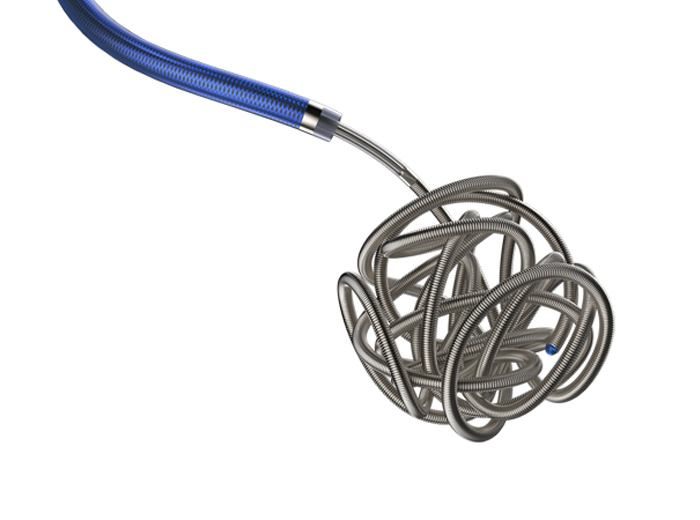the core of our corporate values
Coil Procedure for Cerebral Aneurysm: A Common Endovascular Treatment
A cerebral aneurysm, often referred to as a "ticking time bomb in the brain", is a potentially life-threatening condition. If ruptured, it can cause severe hemorrhagic stroke, leading to devastating consequences. Statistics indicate that approximately one-third of patients with a ruptured cerebral aneurysm do not survive treatment; another one-third may survive but are left with varying degrees of disability, while the remaining third may recover completely.
Principle of the Coil Procedure for Cerebral Aneurysm
The coil procedure for cerebral aneurysm is a widely used endovascular technique that involves inserting coils into the aneurysm to seal it off. These coils are made of detachable, flexible metal materials such as tungsten wire, designed to fit the aneurysm's shape. By sequentially placing multiple coils inside the aneurysm, a dense "plug" is formed, preventing blood from flowing into the aneurysmal sac. This significantly reduces the risk of rupture. The process can be likened to filling a bottle with stones, gradually displacing the water inside to prevent overflow.
Development History of the Coil Procedure
The coil embolization technique was first introduced in 1990 by Italian neurosurgeon Guido Guglielmi. Since then, it has become a standard treatment for cerebral aneurysms. Over the years, advancements in technology have led to several modifications of this technique, including stent-assisted coiling, balloon-assisted embolization, and flow-diverter stents, all of which have further improved the safety and efficacy of the procedure.
Global Application of the Coil Procedure for Cerebral Aneurysm
The United States is at the forefront of the development and application of the coil procedure for cerebral aneurysm. Since its introduction, it has become a standard treatment option in many neurointerventional departments. American medical institutions continuously conduct clinical research to assess the efficacy of coil embolization for different types of aneurysms and to refine treatment techniques. Innovations such as flow-diverter stents and stent-assisted coiling have shown remarkable clinical success, particularly in treating large or wide-neck aneurysms. Additionally, numerous academic institutions and hospitals in the U.S. are actively involved in clinical trials, exploring new coil designs and more precise surgical techniques to further enhance safety and efficacy.
In regions such as Latin America and Southeast Asia, the use of the coil procedure for cerebral aneurysm has been steadily increasing. With the advancement of medical technology and the widespread adoption of modern treatment methods, more hospitals and physicians have begun to integrate this technique, particularly for small to medium-sized aneurysms, achieving promising results. In rapidly developing economies, increased access to medical technology and greater public awareness of modern treatment options have contributed to the rising demand for coil embolization procedures.
Globally, the coil procedure for cerebral aneurysm is gaining widespread acceptance, particularly in developed nations. The successful adoption of this technique is attributed not only to its high effectiveness and safety but also to advancements in imaging technology, continuous improvements in medical devices, and increasing international medical collaboration. Multi-center clinical studies worldwide continue to drive innovation, making aneurysm treatment safer and more precise.
The coil procedure for cerebral aneurysm is a well-established and effective treatment option. With continuous technological advancements, its clinical application has seen significant progress. For many patients with cerebral aneurysms, timely intervention with coil embolization can effectively reduce the risk of rupture, improve prognosis, and ultimately save lives.










